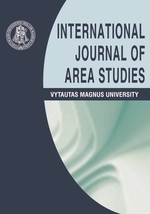Emptying Śūnyatā: a Critical Reading of Nishitani’s Religion and Nothingness
Emptying Śūnyatā: a Critical Reading of Nishitani’s Religion and Nothingness
Author(s): Ramunas MotiekaitisSubject(s): Semiotics / Semiology
Published by: Vytauto Didžiojo Universitetas
Keywords: Semiotics; Buddhism; Śūnyatā; differentiation; dialectics; intentionality.
Summary/Abstract: In this article, invoking some terms of phenomenology and general principles of structural semiotics, I critically examine and reveal some aporetic aspects of Nishitani’s interpretation of Buddhist concept of sūnyatā presented in his seminal work Religion and Nothingness. My critics are directed to deeply ingrained claims among scholars of a “rejection of any form of dualism” and “non-substantial philosophy” as unique characteristics of the Kyoto school or “logic of the East”. My arguments are based on examining how linguistic differentiating articulation and narrative rendering that perform a fundamental role in human cognition are at work in definition of “emptiness” (sūnyatā) too. Thus emptiness is not completely empty; being certain philosophical identity it can be articulated only by differentiation from other identities, and thus different is included in it. Nishitani needed logocentric modes of thought, as a dialectical (m)other for constructing his sūnyatā ontology. Accordingly, the realms that are considered to be secondary or derivative (i.e. sensual and rational, or linguistic representations) appear to be the condition for constituting the primary (suchness of things, sūnyatā). Considering universal mechanisms of the articulation of values I am also asking whether sūnyatā paradigm indeed is so fundamentally different from Western paradigms centered on idea, God, or a rational subject as Nishitani wants to think. Since we find a clear hierarchical differentiation into truth and illusion, authentic and inauthentic modes of thought and time, and initial and derivative ontological realms, features of “strong thought” (in sense of Vattimo) are evident in his work. I am also suggesting, that possibly by considering not sūnyatā or “idea” but human languages as a universal “house of being”, we would be able to “empty” discourses of radical difference and uniqueness, and in this way become post-nationalistically modern. Philosophy, in order not to turn into a onesided ideology, should reflect on its mythological and narratological conditions, i.e. dances on certain semiotic axes. From such a perspective, the gravitational trajectory of human thought, longing for conjunction with the absolute, defined either as God or as sūnyatā, will seem similar rather than different.
Journal: Regioninės studijos
- Issue Year: 2015
- Issue No: 10/1
- Page Range: 69-83
- Page Count: 15

